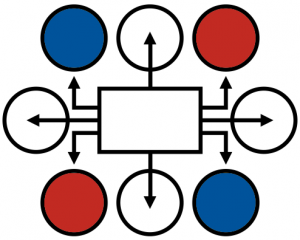Event > Learning & Teaching Open Forum, University of St Andrews
 Wednesday afternoon saw the second of this year’s biannual Learning & Teaching Open Forums at the University of St Andrews. The theme for the afternoon was Inspiring Learning through Research-led Teaching. Opening remarks by Proctor, Professor Lorna Milne, set the scene for three interesting presentations by academics on their approaches, and two presentations by students undertaking the Laidlaw Undergraduate Internship Programme over the summer vacation. Professor Milne indicated that much of the literature around research-led teaching focuses on the separation of these and how this has become institutionalised practice. In reality, however, they were interdependent – as the good practice about to be highlighted would show.
Wednesday afternoon saw the second of this year’s biannual Learning & Teaching Open Forums at the University of St Andrews. The theme for the afternoon was Inspiring Learning through Research-led Teaching. Opening remarks by Proctor, Professor Lorna Milne, set the scene for three interesting presentations by academics on their approaches, and two presentations by students undertaking the Laidlaw Undergraduate Internship Programme over the summer vacation. Professor Milne indicated that much of the literature around research-led teaching focuses on the separation of these and how this has become institutionalised practice. In reality, however, they were interdependent – as the good practice about to be highlighted would show.
Paula Miles from the School of Psychology & Neuroscience outlined an approach being used in Level 1 classes to try and make the link between lectures (theory) and labwork (practice) more explicit and relevant. Instead of being given datasets to work with and analyse, which resulted in quite passive learning, a “Citizen Science” method was taken whereby students were asked to design their own study (gaining insight into the challenges this presents); to collect and analyse their own data; and conclude from it. Although the effects of this on performance had been neutral, student grumbles about a disconnect between teaching and research had diminished, and, critically, students had reported enjoying the classes more.
Professor Frances Andrews from the School of History outlined three ways that research was being integrated with teaching within the School. Firstly, within discrete modules, research was integrated either based on research content, or on research methodologies. She gave two examples of this: a module run by a colleague around specific research content had led to the publication of a student textbook; and a module focusing on specific methodologies had led to a research publication. Prof. Andrews then talked about research around modules and how students should be encouraged to attend both internal PG seminars, and workshops with external, perhaps international, speakers. Field trips could also play a role in sparking enthusiasm for research, and gaining an understanding the research process. The third method was through gaining an appreciation of research through actually doing it – UG research projects leading to Masters and potentially PhDs.
Dr Shiona Chillas from the School of Management talked about how students do not understand how the work they do at University and the skills they acquire are relevant to their future careers, either in academia or in the workforce. In the School they are attempting to highlight the employability value of research activity through a core module on research proposals in Junior Honours. Students are asked to critique an existing piece of research – and then to see how easy or difficult it is to design their own research project. Both the process of doing this, and the outputs are of much more explicit value to employers.
Student contributors Sam Mills and Amy Sheader then presented enthusiastically on the work they will be doing over the summer on their Laidlaw Internships. Sam will be curating and creating a digital database of artefacts relating to pre-cinema moving image technology – and hopes to gain insight into the research process, helping to confirm his future direction of travel. Amy will be working on a Physics project on “optical tweezers” (manipulating tiny particles by exerting extremely small forces via a highly focused laser beam). She hopes to be able to make a connection between lecture material on the topic and the research she is undertaking – and to gain valuable transferable skills.
Themes which came out of discussion throughout the event were:
- We need to move away from teaching research outcomes to teaching research processes.
- Student choice in the process is key.
- Students who lack confidence need to have time spent with them, be supported through small group teaching, and be scaffolded through the different stages of the research process.
- Research is presented through teaching as a narrative of success – involvement in the research process can help students understand the power of failure.